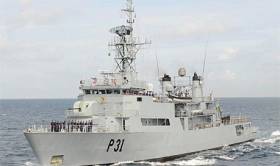Displaying items by tag: Freedom of Entry
'Freedom of Entry' Conferred to Naval Service As Flagship Visits Dun Laoghaire Harbour
#FreedomShip – At a special public event held in Dun Laoghaire Harbour a conferral of ‘Freedom of Entry’ was presented to crew of LÉ Eithne on behalf of the Irish Naval Service, writes Jehan Ashmore.
In the presence of ambassadors and officials among them representing the UK, Italy and China, An Cathaoirleach of Dún Laoghaire-Rathdown County Council, Councillor Cormac Devlin presented the honorary conferral to Lt Cdr. Brian Fitzgerald, commander of LÉ Eithne. Cdr Hugh Tully was also in attendance on behalf of Defence Forces Chief of Defence, Vice Admiral Mark Mellett.
Also at the lunchtime ceremony where members of the public along with local schoolchildren waving the tricolour. The proceedings included a crew party standing to attention with the backdrop of LÉ Eithne berthed behind at St. Michaels Pier. Also sharing the pier was seasonal Dublin Bay excursion boat, St. Bridget.
The ‘Honorary Freedom of Entry to the Council’ was awarded by Dun Laoghaire-Rathdown County Council to the Irish Naval Service in recognition of the humanitarian mission 'Operation Pontus' that was carried out in the Mediterranean on behalf of the people of Ireland and the EU. The conferral was the first ever presented by DLRCC and that of any council.
Master of ceremonies, RTE's Mary Kennedy hightlighted that LÉ Eithne along with fleetmates during Operation Pontus played a significant role in the rescue of 15,000 migrants and refugees. Lt Cdr. Brian Fitzgerald commented LÉ Eithne is to be deployed again to the Mediteranean in a month’s time so to resume humanitarian duties. This he added though is subject to Government approval.
The ceremony also provided an opportunity to mark a more solemn moment as a minutes silence took place to honour those lost in the Irish Coastguard Helicopter tragedy of R116 off Blacksod, Co. Mayo.
Overall command of the search remains with the Coast Guard that had involved LÉ Eithne appointed as On Scene Co-ordinator (OSC) of the operation. This role was transferred to L.É. James Joyce but this OPV has been recently relieved by class leadship L.É. Samuel Beckett in the ongoing operations at Blackrock Island Lighthouse.
On a more joyous note, at the end of proceedings in Dun Laoghaire, the Army No.1 Band led a crew parade from the Harbour Plaza. This saw the parade head up along Marine Road to outside the Town Hall of Dun Laoghaire-Rathdown.
"Freedom of Entry" Award to Naval Service Plus Tours of LÉ Eithne in Dun Laoghaire Harbour
#FreedomShip - An Cathaoirleach of Dún Laoghaire-Rathdown County Council, Councillor Cormac Devlin, cordially invites the public to a ceremony at 13.00hrs today (Friday, 31 March) to mark the conferral of an Honourary Freedom of Entry to the County for the Irish Naval Service.
The Award is in recognition of its humanitarian service on behalf of the people of Ireland and the European Union and to acknowledge the duties undertaken by the Irish Naval Service as part of Operation Pontus. The Award will be accepted by the crew of the LÉ Eithne on behalf of the Irish Naval Service.
As previously reported on Afloat, the LÉ Eithne crew will accept the Freedom of Entry honour at a ceremony held in Dún Laoghaire Harbour Plaza at lunchtime today. There will be live music and a short parade by the Army Band and the crew of the LÉ Eithne.
The event will be mc’d by Mary Kennedy from RTÉ. Following the event the Naval Services will also be offering the public guided tours of the LÉ Eithne this afternoon and evening.
Afloat adds that this will be an opportunity to board the flagship Helicopter Patrol Vessel whose adopted homeport is Dun Laoghaire. The HPV is currently berthed at St. Micheals Pier in view of the Harbour Plaza.
The An Cathaoirleach added he would be delighted for the public to attend this very special event in the year of the Harbour's Bicentennial celebrations.





























































